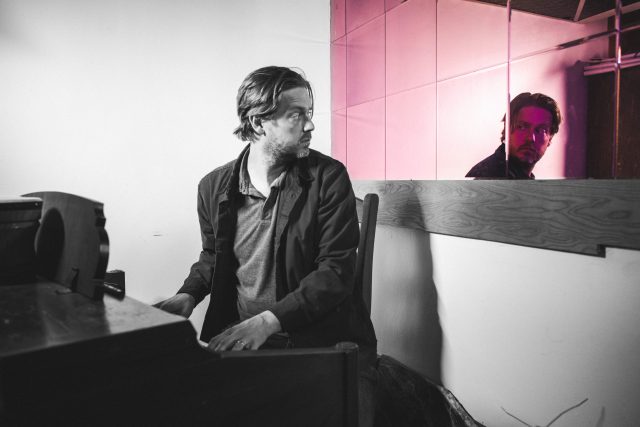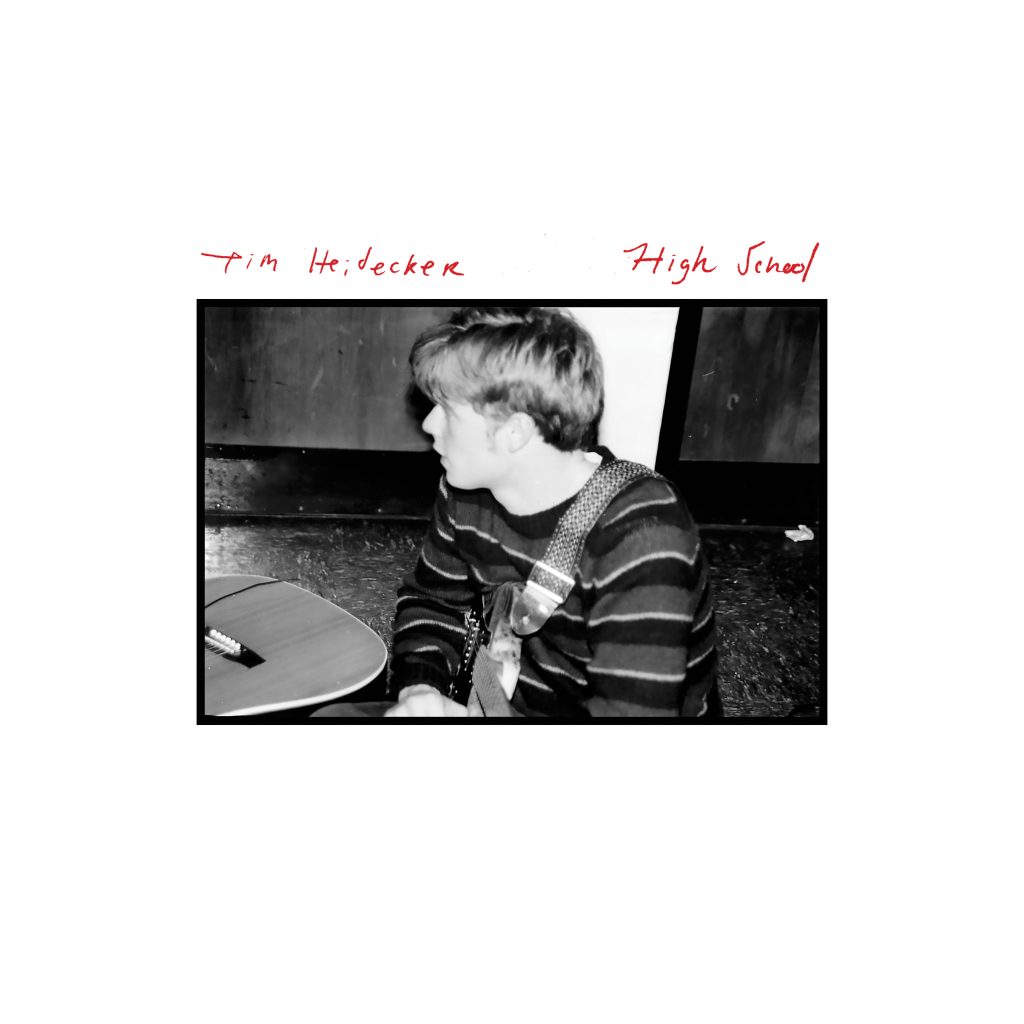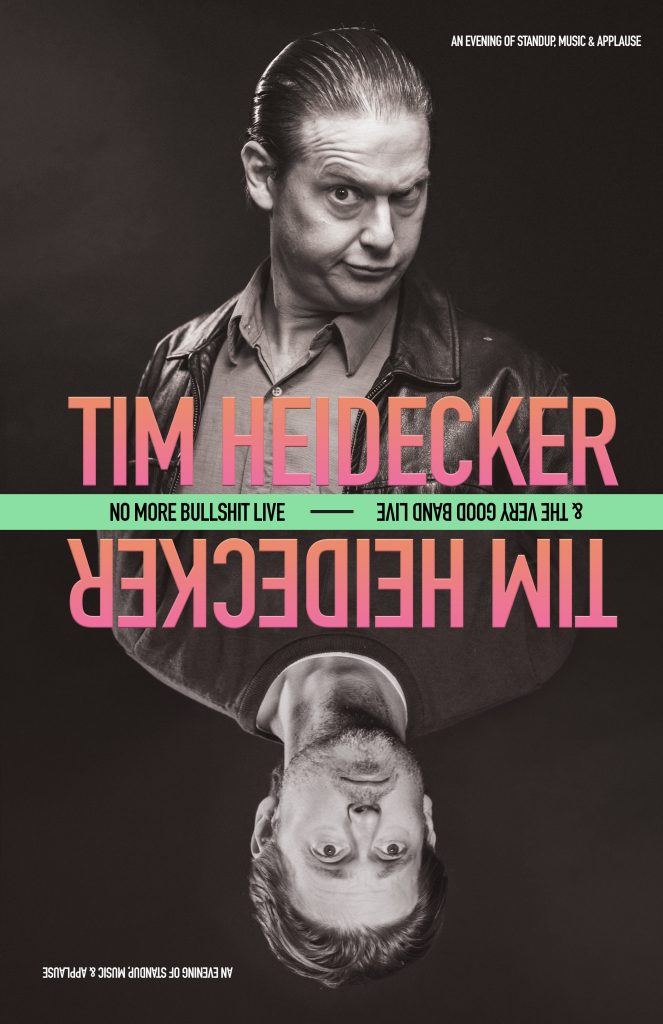
If you’re a millennial of a certain age and persuasion, the unhinged anti-comedy of Tim Heidecker has likely shaped your cerebral cortex into knots that will never untwist. Alongside early collaborator Eric Wareheim, the duo’s Adult Swim breakout Tim and Eric Awesome Show, Great Job! was the absurdist backdrop to many stoned dorm-room late nights for a generation of weirdos during its original run in the late-2000s. Beaming to earth a surrealist swirl of sweaty celebrity cameos and off-the-wall characters through the gauze of a ’90s public-access infomercial fever dream, the groundbreaking sketch show was once described fondly by its creators as “the nightmare version of television.”
It also helped create what once seemed an unlikely celebrity out of Heidecker. In the years since Tim and Eric broke the brains of America’s undergrads, the 47-year-old performer has appeared as an actor on the big screen in contemporary classics of comedy (Bridesmaids), arthouse horror (Us) and big-budget superhero fare (Ant-Man and the Wasp), with recurring turns on big-time streamers like Netflix’s I Think You Should Leave with Tim Robinson and the 18th century send-up Our Flag Means Death.

But Heidecker’s creative drive doesn’t stop in front of the camera, or behind the podcast mic of his long-running call-in show Office Hours and cult-favorite On Cinema. The Pennsylvania native is also an accomplished recording artist, with half a dozen studio albums to his name. His latest, High School, is a straight-faced and tender-hearted collage of adolescent memories, from camping-trip heartbreak (“Chillin’ in Alaska”) to troubled friends who never made it to the other side (“Buddy”). His new record finds him settling in comfortably as an emotionally affecting songwriter with formidable powers of observation and melody — a far cry from the bleeding-edge experimental comedy of his early sketch days, but not so far removed as to dampen the singular sense of humor that brightens the corners of his airtight pop-rock arrangements.
Now comes Live in Boulder, Heidecker’s first live album, recorded during an August 2022 performance at the city’s iconic Boulder Theater — a retrospective full-length of original songs, backed by a musical ensemble billed as The Very Good Band. While last year’s performance opened with a stand-up set in character as the boarish hack comedian from his debut 2020 special, An Evening with Tim Heidecker, the recording sticks to the music with 12 high-energy barn burners and breezy piano ballads that might not feel out of place in the discographies of rock’s great smirkers like Warren Zevon and Randy Newman. And that’s no joke.
Boulder Weekly spoke with Heidecker ahead of the album’s vinyl release June 24 via Spacebomb Records. The following has been edited for brevity and clarity.
I had a blast at your Boulder show last year, and I’m guessing you did too. Why did you decide to release it as your first live record?
It’s kind of a process of elimination, where you record a bunch of shows. In some of them, the mix wasn’t great. Some of them, the performances weren’t as great. And so it kind of came down to a few, and I really wanted the record to feel like it was one night — not just kind of a compilation of shows. And the Boulder show was, I think, maybe the second-to-last of the tour. So by that time, I don’t know if you felt it, but everything was clicking and it sounded good. It just checked all the boxes, and it was just a particularly good night.
I understand you arrived in Boulder after a long night on the road. What was the experience like when you rolled into town?
We had been on the road for about almost a month: living in the bus and having a great time, but feeling a little ready to go home. The drive the night before was from Kansas City, so it was a big haul, an overnight drive. … I got up and got off the bus the next morning [in Boulder] and it was this crisp, beautiful sunny day. And my first thought was, “Oh man, I think the bus crashed somewhere in the Rockies and we’re dead. I’m in heaven.” It was, like, a real second of that feeling: “Oh my god, this place is beautiful.” I walked down to the town square just around the corner from the venue, and it was still a little early, so there weren’t too many people out. It was so gorgeous with the mountains in the background, and I felt very, very happy to be there.

And once you’re on stage that night, you say the band is feeling especially dialed-in. How does the venue itself play into that?
The room sounds different every night. The monitors up on stage become a big part of the show for us, because if you can’t hear yourself or somebody else in the band, you get a little confused or lost — so it’s just a combination of things having to kind of all work together, and it almost never goes off perfectly in my mind. But on that night, there was an issue with the lights, which were blasting the balcony in a very annoying way. I don’t know if you remember that …
I was up there getting blasted in the balcony!
I’m a concertgoer, and I love a good experience at a show. So my mind always goes to, “Oh my god. What’s it like for you people out there? That must suck.” We don’t travel with a light person, so you’re always relying on the house lighting people. And we go through stuff with them, but for some reason there was something crazy going on there. But that’s part of the fun. It’s not boring. We’re not just kind of going through the paces. You’re kind of always reacting to the environment — and to the audience, and to the band.
Boulder Theater just got a new sound system this year, so you’ll have to come back and give it a spin.
I’d love to come back. Everything else about the night, aside from the lights, was great. The venue had a great little backstage, and the food around town was great. There are some places you go and you’re like, “Oh, I wish we could have brought more people in.” But Boulder was one of those where it just sold really well. It was packed. People were psyched. They were enthusiastic and dancing and singing and stuff. So, it definitely feels like a good spot to come back to.
I’d be remiss if we didn’t talk a little about your bandmates on this recording. So I’ll just hit you with a broad question: What makes The Very Good Band so very good?
Wow. Well, they’re all super pro. Everyone comes from playing in bands and doing sessions. Ellie [Eliana Athayde], our bass player, is classically trained and comes from a jazz and classical background. What she’s doing [with my music], she could do with her eyes closed, because it’s fairly simple rock ’n’ roll and folk music. They’re all just super high level. We all really get along and love playing together. And we make each other laugh — they’re all very funny in their own ways.
It’s very natural and comfortable playing together, which I didn’t know going into this tour. I had put this band together through some recommendations, and I knew them a little but not too well. So I think certainly by the time we got to Boulder, we were kind of gelled and connected as friends traveling together. We all have acknowledged in different ways, at different times, just how lucky we feel to have all found each other. Because we want to do it again, and are doing it again this summer. I want to try to keep it going as long as I can.

That was at least the third time Eliana had come through town that year. I saw her twice in Boulder County with Waxahatchee [at the 2022 Bluebird and Mabon music festivals]. So it was really cool to kind of get to know this great side player on stage throughout the summer. It was a fun little Easter egg to see her in your band: “Hey, I remember her!”
What’s fun is that we introduce the band during that second act at the top of the show — and early in the tour, there was kind of a polite applause as they came out; but then as the tour kept going, and I kept including them in my [social media] posts and showing little videos of them online and stuff, people were really excited to see them too. Their own personalities are coming through on stage.
And yeah, I mean, singing with Ellie is great. I think we have a nice blend, and having that musical support is good too, because I consider myself kind of a novice. So, it’s great to know that they can kind of be behind me, making my stuff sound as good as possible. Playing with them, I think, has made me a better player. We’re all getting something really special out of the experience.
Let’s talk about the comedy side of the show — which is not on the record, but was part of the tour. What’s it like to slip between those two modes as a performer, and is the night as exhausting as it looks?
The transition is actually really natural, I think. I spend maybe like a minute before I come out as a stand-up guy, just looking at my notes, warming up, stretching and kind of getting into the mindset. It doesn’t take very much. It’s really ignited by coming out there to the music and reacting to the crowd. And by the end of it, I’m relieved to get offstage — but it happens so fast that the transition is not something I’m super conscious of. I’m more just focused on getting into a different look, taking a breath, having some water and resetting.
What has been nice, which I was hoping would happen on this tour, is that I don’t have to turn off the funny button in my head for the second half. There’s plenty of places [in the show] where I can be myself but also be funny as myself, and not treat the music side like suddenly, “No more jokes!” We can play around, and I can play with the audience and play with Vic [Berger IV] and keep it fairly light so it feels like a well-rounded evening of entertainment. I’m not suddenly, you know, transitioning into another character as a mopey indie-rock band leader.
In terms of being funny as yourself, I’m thinking now about your cover of Bob Dylan’s bizarre song about Lenny Bruce.
That’s the funniest thing, because … I don’t remember, is it on the record?
I don’t think so.
Yeah. I don’t love to put stuff like that out while I’m still touring it, because there’s something about the surprise that really makes it work for the audience. If they had listened to that whole bit ahead of the show, it would kind of spoil it.
When I do the stand-up stuff, there are definitely places where I know the laughs are going to happen. They kind of happen consistently, and sometimes I don’t even understand it. It’s like, I say something and it works, but it’s often this kind of rolling, after-the-joke kind of laughter. It’s not your traditional reaction to comedy. But in that Lenny Bruce section, it’s as close as I get to feeling like a regular comedian. It works every night, in the same way, with everybody. So it’s a really fun part of the show for me.
You asked, “Is it exhausting?” It’s totally exhausting. But in the show, there are great places like that where I can kind of catch my breath. There’s a couple of slow songs. There’s the two songs on piano. I can [slow down] and get a sip of water and not be jumping around and screaming my head off.

Back to the comedy side of things: It seems like a tall order to do this imitation of a hacky stand-up act that’s legitimately funny. How do you know when you’ve gotten the material to a place that’s actually going to make people laugh, and isn’t just off-putting or obnoxious?
It’s trial and error. Living in L.A., there’s lots of little clubs and theaters where I can do 10 or 15 minutes. That’s a good place for me to try a few new ideas. So there are things I just learned work there. And like I said, the band is really funny, and they’re really into that part of the show too. I think they feel kind of invested in their own way. So I’ll run things by them. Sometimes they’ll suggest an idea, or throw out a prompt for me to think about.
I don’t want to be intentionally offensive just because I can get away with it under the mask of this character. There’s a way you could go out there and do that guy and he’s just completely awful and unpleasant. I’m always trying to make sure that the joke is on this guy, not making the audience feel uncomfortable. And I think most people coming to the show know the context, so they’re also playing a role. A lot of the laughs are, like, fake laughs — and that’s good, too. Some jokes are bad, but people kind of laugh because most jokes are sort of bad anyways.
You’ve got another round of the Two Tims tour happening this summer. Have you learned anything from these earlier runs that you’ll be taking with you on the new leg?
The show is always changing. We swap songs out. The comedy set always changes. It definitely is the kind of show where we’ve just kind of jumped into it and learned by doing. Sometimes it’s hard to change things too much because the wheels are already turning, but I love mixing it up and I hope we can do that a little bit on this next run without totally reengineering it.
Here’s a great example. I don’t know if this is interesting, but it’s interesting to me. In England, our driver-slash-roadie was this really funny British guy, a classic rock kind of guy — like Rock ’N’ Roll Gary, if you know that reference to my work. He loved the show and was watching it every night. And he was like: “At the end of the show, the band should come out and take a bow; they should do a curtain call. Because the audience has loved them all night, and there’s not a good opportunity to really show it.” I thought that was so sweet.
And they were like, “OK, we’ll try it,” and it just worked so nice for stagecraft reasons. It just feels nice. It feels like the end of the show. [The audience has] had enough of me and I’ve done my several bows. It’s little things like that, you know: The show is really different and unique because it is so loose and it does often feel kind of like a comment on what a rock show is. We make fun of encores. We make fun of solos and that kind of thing. But you want it to feel like there’s a polish and a professionalism to it. It’s those little things that maybe you don’t consciously pick up on, but sort of seep into the feeling that it was a full and rewarding night.
Well, that’s how it felt out here in Colorado. Thanks for taking the time to talk today — and for the show. It was really a pleasure to chat with you.
I appreciate it. See you next time I’m in Boulder.
Tim Heidecker and The Very Good Band: Live in Boulder is available now via Spacebomb Records on limited-edition purple vinyl, and digitally on major streaming platforms.














